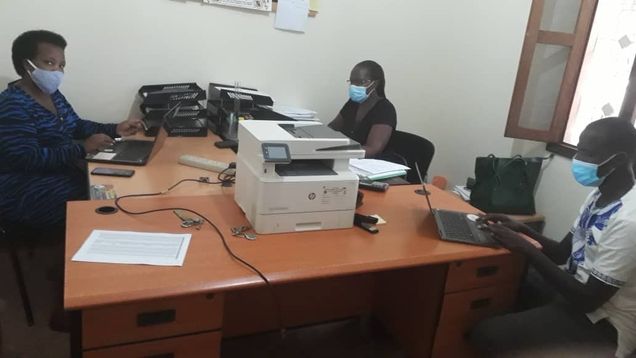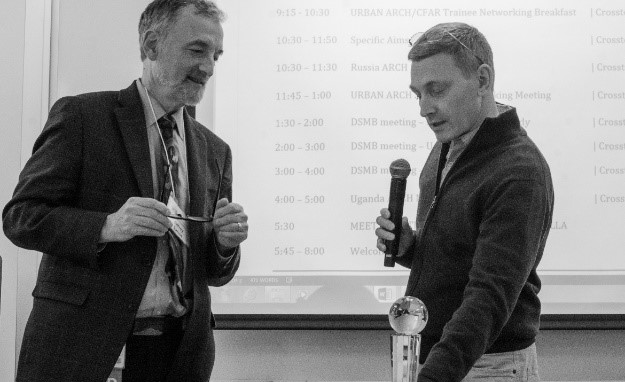Core and Cohort Updates
Admin Core
The URBAN ARCH Administrative Core remains busy as the world seems to be slowing down due to the COVID-19 pandemic. The Admin Core continues to facilitate communication to advance collaborations between the consortium components. During this uncertain time, each core and cohort have had to make changes to their protocols and procedures, from transitioning to working remotely and conducting phone assessments, to pausing some study activities. More details on these individual changes are covered in our Main Story! From scheduling and leading renewal discussions, to encouraging supplement submissions, the Admin Core continues to aid the consortium through the combination of scientific and administrative leadership, from an acceptable social distance (>/= 6 ft.).

Summer has promptly arrived, and the Admin Core has started to prepare for the fall and upcoming year. The DSMB meeting has been scheduled for September 29th, and the 2021 Annual Meeting will take place on March 16th and 17th, 2021. Due to COVID-19, all shipping from the sample repository is on hold for now. The team looks forward to when shipment processing can be reinstated.
Despite physical distance, the Admin Core has continued to connect with each other through frequent Zoom meetings. Although we miss our coworkers and the office very much, it has been a fun challenge to find new ways to stay connected.
BDM Core
The BDM Core continues to be actively involved in several data management and biostatistics activities across URBAN ARCH. All core activities and functions have continued to run smoothly as members work remotely. The Core has been working to develop numerous analytic plans and manuscripts that are in progress. The BDM Core also recently collaborated with investigators from each of the 3 cohorts on supplemental COVID applications.
Uganda Cohort
ADEPTT
In January, 2020, the ADEPTT study concluded enrollment with 302 participants, including 155 females and 147 males. Of these, 200 are current alcohol drinkers and 102 are alcohol abstainers. To achieve our enrollment, we screened 1,434 patients from the Mbarara ISS Clinic, of whom 1,312 were consented for further screening for latent TB. Out of 1,192 PPD placements completed, 308 (26%) participants had positive results for latent TB and were eligible for the study and 302 enrolled.
Due to the COVID-19 pandemic and the Public Health response, all study activities were paused on March 26, 2020. We also asked all participants to stop taking their INH prescriptions. On May 26, 2020, many of the COVID restrictions were eased, therefore we resumed study follow up activities, prioritizing the restarting of INH on those who had stopped.

Retention has been excellent. At the time of the study pause, we had completed baseline procedures for all 302 participants enrolled and completed 939 follow up visits. Twenty-four participants had discontinued TB preventive therapy (INH) due to grade 3/4 level toxicities and three women had discontinued INH due to being pregnant.
Accepted Manuscripts:
- Foley J.D., Sheinfil A, Woolf-King SE, Fatch R, Emenyonu N, Muyindike WR, Kekibiina A, Ngabirano C, Samet JH, Cheng DM, Hahn JA. Assessing the Interaction between Depressive Symptoms and Alcohol Use Prior to Antiretroviral Therapy on Viral Suppression among People Living with HIV in Rural Uganda. AIDS Care. 2020;1:1-7
- Muyindike W, Fatch R, Cheng DM, Emenyonu NI, Ngabirano C, Adong J, Linas BP, Jacobson KR, Hahn JA. Tuberculin skin test positivity among HIV-infected alcohol drinkers on antiretrovirals in south-western Uganda. PLoS One. 2020.
DIPT
The DIPT study, which aims to determine whether economic incentives contingent on reduced alcohol use reduces heavy alcohol use over six months of isoniazid (INH) preventive therapy (IPT), is progressing well and continued to screen and enroll eligible individuals until March 19, 2020, when recruitment and enrollment were paused due to COVID-19 restrictions. All study activities were paused, including INH treatment, as mentioned above in the ADEPTT study updates, on March 26th, 2020 and reinstated on May 26th, 2020.
At the time of pausing study activities, we had enrolled 435 EtG-confirmed heavy drinkers with latent TB out of our target enrollment of 680. We have screened 3,306 individuals, of whom 2,629 were further screened to determine heavy drinking status using the point-of-care ethyl glucuronide (EtG) test. Out of the 2,518 who completed EtG testing, 1,235 (49%) were EtG positive. Of those who were EtG-positive, we placed 1,136 PPD skin tests to confirm latent TB status. From this, 450 (40%) participants had latent TB and were eligible for the study. Retention has been excellent. A total of 909 follow-up visits have been completed (over 95% of those expected).
We are working on analyses and manuscripts from the baseline data, including an analysis of urine EtG results compared to self-report, post-traumatic stress disorder, and trial methods. We recently completed a manuscript showing that a very high level of alcohol use was significantly associated with TST-positivity compared to medium level (aOR 1.61, 95%CI: 1.03-2.50, p=0.04). The manuscript is online at Clinical Infectious Diseases (Puryear et al, May 6, 2020; PMCID pending).
We have provided training and mentorship in manuscript preparation to the Uganda-based team including the field project coordinator (Kekibiina) and data manager (Tumwegamire). Ms Kekibiina is currently working on a manuscript analyzing Post Traumatic Stress Disorder in the DIPT cohort. Ms. Tumwegamire is also working on a manuscript that examines the association of smoking and viral suppression in the DIPT cohort.
EXTEND
The main aims of the EXTEND RCT are to estimate the uptake and acceptability, preliminary efficacy, and cost of methods of delivery of an intervention to reduce unhealthy drinking and HIV viral failure among persons in HIV care in rural Uganda (n=270). To date, we have screened a total of 491 patients at the Mbarara ISS Clinic and enrolled 122 participants including 80 males and 42 females. Of the 122 participants enrolled in the RCT, 38 were randomized to arm 1 (in-persons counseling plus live call boosters); 42 were randomized to arm 2 (in-person counseling plus automated boosters); and 42 were randomized to arm 3 (standard of care, wait-list control). Participants in arm 2 (automated boosters) are given a choice between Interactive Voice Response (IVR) or Short Message service (SMS) messages for their booster sessions. Unlike ADEPTT and DIPT, EXTEND was able to continue some study activities with participants remotely.
Russia Cohort
Three-month completion rate for St PETER as of June 1st is 87%. We expect to complete follow-up for St PETER by the end of 2020. The team has quickly responded to the COVID-19 pandemic, making various adaptations to study procedures, administering a new COVID-19 questionnaire, as well as submitting a supplemental application relating to COVID-19. Further detail can be found in the Main Story.
Congratulations to the team on the publication of the ZINC RCT in JAMA Network Open! A summary of the article can be found here.
In early March, members of the Russian study team traveled to Boston to attend the URBAN ARCH Annual Meeting, where we discussed study progress and future analyses.


The team is actively pursuing data analyses, abstract submissions, and manuscript preparation.
Accepted Abstracts:
- Mensah SO, et al. The association between heavy alcohol consumption and trimethylamine N-oxide (TMAO) levels: a cross sectional study. ACER. 2020;44(s1):152.
- So-Armah KA, et al. HIV, alcohol and dysbiosis – exploring the association between alcohol and dysbiosis among HIV-positive heavy drinkers. ACER. 2020;44(s1):676.
- Vetrova M, et al. A Longitudinal Analysis of HIV stigma and ART initiation among HIV-positive people who inject drugs in Saint Petersburg, Russia. Accepted to 2020 NIDA International Forum.
- Yaroslavtseva T, et al. Electronic cigarette use among HIV-positive heavy drinking smokers in Russia. Accepted to College on Problems of Drug Dependence (CPDD) 2020.
- Fuster D, et al. Tobacco use and liver fibrosis in HIV-infected Russians. Accepted to CPDD 2020.
- Vetrova M, et al. Public, private, or which way to go? HIV-positive patients’ navigation of addiction care in Saint Petersburg, Russia – a qualitative study. Accepted to International AIDS Society Virtual Conference 2020
Published Manuscripts:
- Freiberg MS, Cheng DM, Gnatienko N, Blokhina E, Coleman S, Doyle M, Yaroslavtseva T, Bridden C, So-Armah KA, Tracy R, Bryant KJ, Lionzov D, Krupitsky EM, Samet JH. Effect of zinc supplementation vs placebo on mortality risk and HIV disease progression among HIV-positive adults with heavy alcohol use: a randomized clinical trial. JAMA Netw Open. 2020;3(5):e204330. PMCID: PMC7210486
- Sereda Y, Kiriazova T, Makarenko O, Carroll JJ, Rybak N, Chybisov A, Bendiks S, Idrisov B, Dutta A, Gillani FS, Samet JH, Flanigan T, Lunze K. Stigma and quality of co-located care for HIV-positive people in addiction treatment in Ukraine: a cross-sectional study. J Int AIDS Soc. 2020;23(5):e25492. PMCID: PMC7201176
Boston Cohort
As of June 1, 2020, the Boston ARCH team has completed 251 baseline visits (176 with participants from the original Boston ARCH Bone Cohort and 75 with participants new to the cohort). Follow-up assessments are ongoing and have included 304 total interviews. Additionally, we have completed 5 individual qualitative interviews. Qualitative data will inform the development of a falls prevention intervention.
In March 2020, due to the rapid spread of COVID-19 in the US, the team was required to stop all in-person participant interaction. Since then, the in-person annual assessments have been restructured and split into two parts to effectively facilitate continuation of the study through remote data collection, where possible. The interview portions of the annual assessment that can be conducted remotely are being completed by either Zoom or phone call, and the portions of the annual assessment that must be done in-person (such as balance testing, grip strength, and walking speed) will be completed when in-person research is allowed to resume. Furthermore, we have also restructured the qualitative interview and focus group formats so that they can be conducted remotely (via phone or Zoom). We expect to begin conducting remote focus groups and interviews for the qualitative research in the summer.
We have submitted an amendment to the Institutional Review Board to add a short battery of COVID-related questions to the existing Boston ARCH assessments to assess the impact of the COVID-19 pandemic on the Boston cohort.
In May, we submitted a proposal to expand the scope of our existing Boston ARCH study with an urgent competitive revision, in response to a Notice of Special Interest issued by NIAAA. The proposal draws on the Boston ARCH parent grant infrastructure to study pandemic effects on alcohol use in people living with HIV. If funded, the team will administer a supplemental COVID-19 specific assessment to Boston ARCH participants at two time points (6 months apart). Data on substance use, depression, and frailty, collected during pre-pandemic assessments as part of the parent study, will be compared against data collected via supplemental COVID-specific assessments. The goal of the proposal is to assess the impact of the COVID-19 pandemic and the effects of physical (social) distancing and other mitigation strategies on substance use (heavy alcohol use and/or other drug use including nonmedical prescription medication use) and HIV medication adherence among people living with HIV.
Recent publications include:
- Raja A, Heeren TC, Walley AY, Winter MR, Mesic A, Saitz R. Food insecurity and substance use in people with HIV infection and substance use disorder. Substance Abuse. 2020;1-9.
- Kim TW, Ventura AS, Winter MR, Heeren TC, Holick MF, Walley AY, Bryant KJ, and Saitz R. Alcohol and Bone Turnover Markers among People Living with HIV and Substance Use Disorder. Alcohol Clin Exp Res. 2020;44(4):992-1000. PMCID: PMC7263383